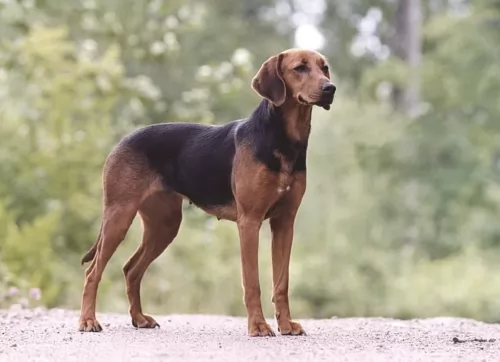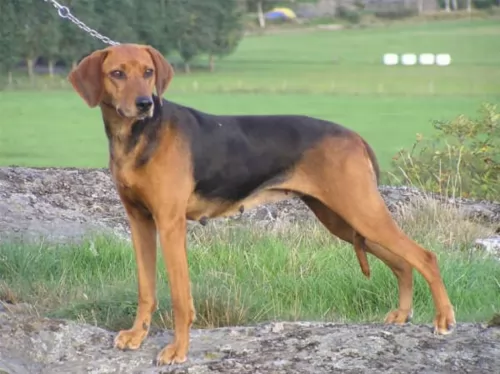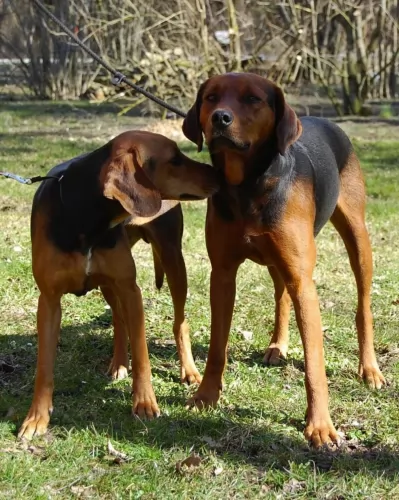 Petzlover
Petzlover Schillerstovare is originated from Sweden but Sealyham Terrier is originated from United Kingdom. Schillerstovare may grow 31 cm / 13 inches higher than Sealyham Terrier. Schillerstovare may weigh 16 kg / 36 pounds more than Sealyham Terrier. Both Schillerstovare and Sealyham Terrier has almost same life span. Both Schillerstovare and Sealyham Terrier has almost same litter size. Schillerstovare requires Low Maintenance. But Sealyham Terrier requires Moderate Maintenance
Schillerstovare is originated from Sweden but Sealyham Terrier is originated from United Kingdom. Schillerstovare may grow 31 cm / 13 inches higher than Sealyham Terrier. Schillerstovare may weigh 16 kg / 36 pounds more than Sealyham Terrier. Both Schillerstovare and Sealyham Terrier has almost same life span. Both Schillerstovare and Sealyham Terrier has almost same litter size. Schillerstovare requires Low Maintenance. But Sealyham Terrier requires Moderate Maintenance
 The Schillerstövare originated in Sweden, being named after a Swedish farmer, Per Schiller. After he died, the dog was named Schillerstövare in 1907, and was Sweden's first native dog breed.
The Schillerstövare originated in Sweden, being named after a Swedish farmer, Per Schiller. After he died, the dog was named Schillerstövare in 1907, and was Sweden's first native dog breed.
The Swedish Kennel Club recognised this dog in 1907 and it is also recognised by the Federation Cynologique Internationale as well as a number of minor kennels and dog clubs.
The dog has always been used as a hunting dog and the English Foxhound is the e foundation for this breed.
 The Sealyham Terrier is a rare dog breed originating in Wales. The dog was developed in the 19th century by Captain John Edwardes at Sealyham House. The Sealy has been associated with members of the British Royal Family, but its numbers declined to such an extent that it was listed as a vulnerable native breed by the Kennel Club.
The Sealyham Terrier is a rare dog breed originating in Wales. The dog was developed in the 19th century by Captain John Edwardes at Sealyham House. The Sealy has been associated with members of the British Royal Family, but its numbers declined to such an extent that it was listed as a vulnerable native breed by the Kennel Club.
The Sealyham Terrier club was created in 1908 and the dog breed was officially recognised by the Kennel Club in 1911. This dog is now recognized by all the major kennel clubs. The American Sealyham Terrier Club was founded in 1913.
 The Schillerstövare is a medium to large sized dog. They’re athletic and muscular.
The Schillerstövare is a medium to large sized dog. They’re athletic and muscular.
Standing at between 53–61cm in height and weighing in the region of 18–25kg, the coat of the dog is fairly short and harsh, with the color being black and tan.Sometimes you’ll see some white markings on the chest and paws.
The head is domed, the eyes brown, bright and alert and the ears of the dog are broad, medium length and floppy. The long tail is carried low or held out when running or alert.
If you allow your Schillerstovare to have puppies, you can expect between 3 to 7.
The Schillerstovare is a calm dog but he can get petty lively when there’s a game to be had. He gets on well with well disciplined children who have been taught to be kind and respectful to animals. He also gets on well with pets in the home. Just like with most other dogs, he will need to be trained and socialized as he is a strong willed, confident, dominant dog.
He is friendly and active but will be somewhat reserved around strangers.These dogs will require a lot of exercise and will need quite a bit of space too. They aren't well suited to small properties in the city. He will need a daily walk but also a chance to get off his leash and run free in the park. Other forms of exercise such as hikes, ball game and swimming will delight him.
 The Sealyham is a dog that stands low to the ground and its height shouldn’t exceed 27 - 30cm and weight should be about 8 - 9kg.
The Sealyham is a dog that stands low to the ground and its height shouldn’t exceed 27 - 30cm and weight should be about 8 - 9kg.
The double coat is considered non-shedding and is wiry and weather resistant. It is nearly always white but can be fawn. They’ve got big heads with dark, deep set eyes. The ears are semi-erect, semi-floppy and the tail is usually docked.
Affectionately referred to as Sealy, there aren't too many of these little dogs left. At one time, they were a very popular terrier breed, but today they are uncommon – almost endangered.
He’s a social dog with his human family but tends to be reserved around strangers. He also tends to be just a little bit more mellow than some of the more rowdier terrier breeds.
He gets on well with other dogs in the home as well as with children. He is an intelligent little dog but is inclined to be stubborn so you have to show him both firmness and kindness and also think about obedience training for him.
He’s amicable and adjusts well to life in the city or the countryside.
 Schillerstovares are social, loving, friendly, loyal dogs who enjoy being around their human family. He’s going to need a lot of exercise, both mental and physical to keep him from boredom and frustration.
Schillerstovares are social, loving, friendly, loyal dogs who enjoy being around their human family. He’s going to need a lot of exercise, both mental and physical to keep him from boredom and frustration.
He will rely on you for at least a daily walk. He is strong-will and confident and will do well in a family where they are active and where they are firm, patient, kind and consistent in their behaviour towards him because then he ticks all th right boxes for being a splendid pet.
 The Sealyham Terrier is such a robust little dog with a distinctive look.
The Sealyham Terrier is such a robust little dog with a distinctive look.
He can be stubborn but he loves his human family and is sociable and amicable with them, slotting in to their way of life. He can be a couch potato or an active outdoor dog – whatever is required of him and he makes and excellent, loving family pet and companion.
 Even though your Schillerstovare is a healthy dog breed, hip dysplasia is a common dog disease that many dogs get.
Even though your Schillerstovare is a healthy dog breed, hip dysplasia is a common dog disease that many dogs get.
This is a skeletal disease when a dog’s hip joints become partially dislocated. It can be very difficult for your dog to get around, and he can also develop arthritis. It gets very sad when your dog doesn’t even want to participate in games anymore.
 This is a hardy dog breed and you don’t hear of many health problems associated with him. It seems as though you might have to watch out for an eye condition known as lens luxation. It's an eye condition with dogs where the lens slips out of position because of weakening of the fibers that hold it in place.
This is a hardy dog breed and you don’t hear of many health problems associated with him. It seems as though you might have to watch out for an eye condition known as lens luxation. It's an eye condition with dogs where the lens slips out of position because of weakening of the fibers that hold it in place.
There is a lack of fluid in the eye causing optic nerve damage and this can lead to blindness.
Retinal Dysplasia is another eye problem . This is a developmental malformation of the retina that the dog is born with. Symptoms in dogs are a reluctance to jump off things such as the bed or he may even bump into things.
Atopic Dermatitis is something the Sealyham is more prone to. Its an allergic skin disease which drives a dog mad with its itchiness. Your pet will certainly need treatment from the vet to relieve it.
 With his short coat, the Schillerstovare is considered a low maintenance dog and requires a minimal amount of grooming. Brushing should be done twice a week to remove loose hair. The harsh outer coat seems to repel dirt and dust.
With his short coat, the Schillerstovare is considered a low maintenance dog and requires a minimal amount of grooming. Brushing should be done twice a week to remove loose hair. The harsh outer coat seems to repel dirt and dust.
Trim your pet’s nails, check inside his ears for signs of redness, make sure his eyes are bright and clear and make sure he doesn’t have any unusual lumps on him.
Make sure his vaccines are up to date to avoid deadly canine diseases. Take him to the vet when you suspect he isn’t his normal self.
Dogs, just like humans, do well on good, nutritious diets. Feed a human lots of junk food and sweets and they’ll grow up to be obese and unhealthy. That's exactly how it is with dogs too. Some of the best commercially manufactured dog foods are convenient and they can be good if you look at the top brands. Look for ones that cater for your dog’s age, size, breed and activity levels. This dry kibble can be made more inviting for your pet when you include some homemade food.
Dogs just want simplicity so that they don’t battle with digestive problems. Boiled chicken, sweet potatoes, brown rice or pasta, carrots and spinach will be wonderful for him when you chop the food up and add it into the dry kibble twice a week. See his tail wag and his brown eyes light up when he smells this treat. Some raw meat added up occasionally will also contribute to your pet’s heath.
Make sure he is never without a constant supply of fresh, cool water.
 Provide your Sealy with his own warm, dry bed.
Provide your Sealy with his own warm, dry bed.
Brush the long, weather-resistant coat at least twice a week. Hand-stripping of the coat will maintain the wiry, hard texture, but because this method can be quite a laborious process, many Sealy owners rather have their dog professionally clipped.
Check inside his mouth for bad teeth as well as inside the ears for signs of infection. His eyes should also be clear and free of discharge.
His nails will also need to be trimmed.
The Sealyham doesn’t require a lot of exercise but he must at least be given a walk every day.
Ensure the vaccines are up to date. They start when your pet is just a puppy. Remember to get your dog to the vet when you suspect that he is ill.
Feed your Sealyham with good food. Make sure you’re feeding your pet a high quality food as this promotes health and longevity. Provide your Santal Hound with top quality food to ensure his health.
Always choose the quality commercially manufactured foods on the market – those that have natural, good ingredients in them. Try to include some home-made food for him which can be simply mixed into the dry kibble twice a week.
There is no need to offer your dog a host of different foods. Dogs want simplicity and consistency. Boiled chicken, brown rice or pasta and spinach, sweet potatoes and carrots is super tasty and nutritious. If you can, also try and include a little bit of raw meat to his diet occasionally as this can go towards ensuring he doesn’t get skin diseases.
Make sure that a constant supply of fresh, cool water is available to your dog.